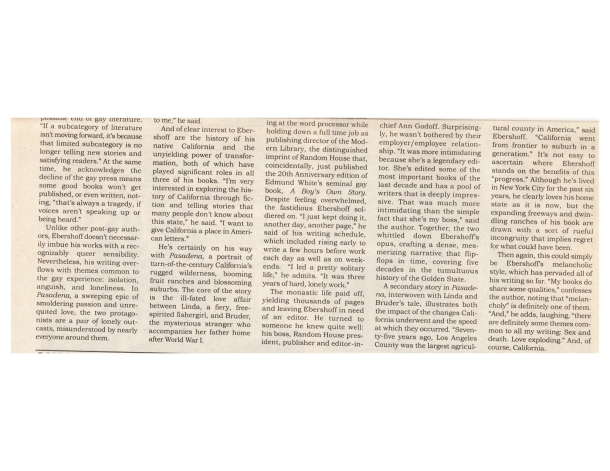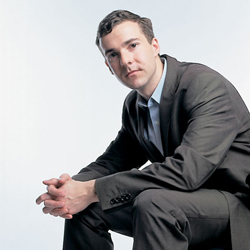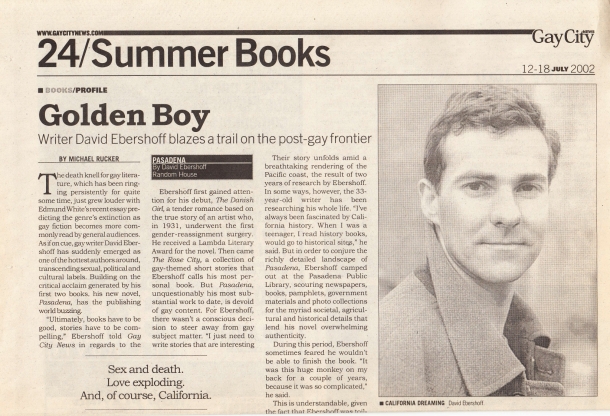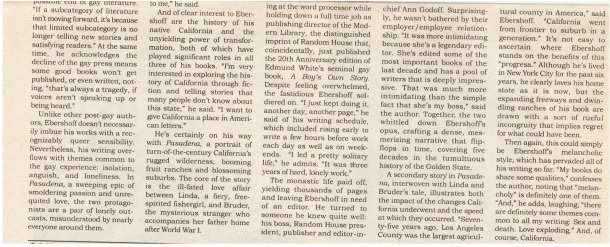Golden Boy
Writer David Ebershoff blazes a trail on the postgay frontier
The death knell for gay literature, which has been ringing persistently for quite some time, just grew louder with Edmund White’s recent essay predicting the genre’s extinction as gay fiction becomes more commonly read by general audiences. As if on cue, gay writer David Ebershoff has suddenly emerged as one of the hottest authors around, transcending sexual, political and cultural labels. Building on the critical acclaim generated by his first two books, his new novel, Pasadena, has the publishing industry buzzing.
Ebershoff remains undecided concerning the possible end of gay literature. “Ultimately, books have to be good, stories have to be compelling,” he says. “If a subcategory of literature isn’t moving forward, it’s because that limited subcategory is no longer telling new stories and satisfying readers.” At the same time, he acknowledges the decline of the gay press means some good books won’t get published, or even written, noting “that’s always a tragedy, if voices aren’t speaking up or being heard.”
Unlike other postgay authors, Ebershoff doesn’t necessarily imbue his works with a “queer” sensibility. Nevertheless, his writing overflows with themes common to the gay experience: isolation, anguish, and loneliness. In Pasadena, a sweeping epic of smoldering passion and unrequited love, the two protagonists are a pair of lonely outcasts, misunderstood by nearly everyone around them.
Ebershoff received a Lambda Literary Award for his first novel, The Danish Girl, a tender romance based on the true story of an artist who in 1931 underwent the first gender-reassignment surgery. Then came The Rose City, a collection of gay-themed short stories that Ebershoff calls his most personal book. But Pasadena, unquestionably his most substantial work to date, is devoid of gay content. For Ebershoff, there wasn’t a conscious decision to steer away from gay subject matter. “I just need to write stories that are interesting to me,” he says.
And of clear interest to Ebershoff are the history of his native California and the unyielding power of transformation, both of which have played significant roles in all three of his books. “I’m very interested in exploring the history of California through fiction and telling stories that many people don’t know about this state,” he says. “I want to give California a place in American letters.”
He’s certainly on his way with Pasadena, a vivid portrait of turn-of-the-century California’s rugged wilderness, booming fruit ranches and blossoming suburbs. The core of the story is the ill-fated love affair between Linda, a fiery, free-spirited fishergirl, and Bruder, the mysterious stranger who accompanies her father home after World War I.
Their story unfolds amid a breathtaking rendering of the Pacific coast, the result of a two-year research endeavor by Ebershoff. In some ways, however, the writer has been researching his whole life. “I’ve always been fascinated by California history. When I was a teenager, I read history books, would go to historical sites,” he says. But in order to conjure the richly detailed landscape of Pasadena, Ebershoff camped out at the Pasadena Public Library, scouring newspapers, books, pamphlets, government materials and photo collections for the myriad societal, agricultural and historical details that lend his novel such overwhelming authenticity.
During this period, Ebershoff sometimes feared he wouldn’t be able to finish the book. “It was this huge monkey on my back for a couple of years, because it was so complicated,” he says. This is understandable, given the fact that Ebershoff was toiling at the word processor while holding down a full time job as publishing director of the Modern Library, the distinguished imprint of Random House that, coincidentally, just published the 20th Anniversary edition of Edmund White’s seminal gay book, A Boy’s Own Story. Despite feeling overwhelmed, the fastidious Ebershoff soldiered on. “I just kept doing it, another day, another page,” he says of his writing schedule, which included rising early to write a few hours before work each day as well as on weekends. “I led a pretty solitary life,” he admits. “It was three years of hard, lonely work.”
The monastic life paid off, yielding thousands of pages and leaving Ebershoff in need of an editor. He turned to someone he knew quite well: his boss, Random House president, publisher and editor-in-chief Ann Godoff. Surprisingly, he wasn’t bothered by their employer/employee status. “It was more intimidating because she’s a legendary editor. She’s edited some of the most important books of the last decade and has a pool of writers that’s deeply impressive. That was much more intimidating than the simple fact that she’s my boss,” says the author. Together, the two whittled down Ebershoff’s opus, crafting a dense, mesmerizing narrative that flip-flops in time, covering five decades in the tumultuous history of the Golden State.
A secondary story in Pasadena, interwoven with Linda and Bruder’s tale, illustrates both the impact of the colossal changes California underwent and the speed at which they occurred. “Seventy-five years ago, Los Angeles County was the largest agricultural county in America,” says Ebershoff. “California went from frontier to suburb in a generation.” It’s not easy to ascertain where Ebershoff stands on the benefits of this “progress.” Although he’s lived in New York City for the past six years, he clearly loves his home state as it is now, but the expanding freeways and dwindling ranchos of his book are drawn with a sort of rueful incongruity that implies regret for what could have been.
Then again, this could simply be Ebershoff’s melancholic style, which has pervaded all of his writing so far. “My books do share some qualities,” confesses the author, noting that “melancholy” is definitely one of them. “And,” he adds, laughing, “there are definitely some themes common to all my writing: Sex and death. Love exploding.” And, of course, California.
Click to view clip


